段落翻译(原文+译文)
- 格式:doc
- 大小:67.50 KB
- 文档页数:12
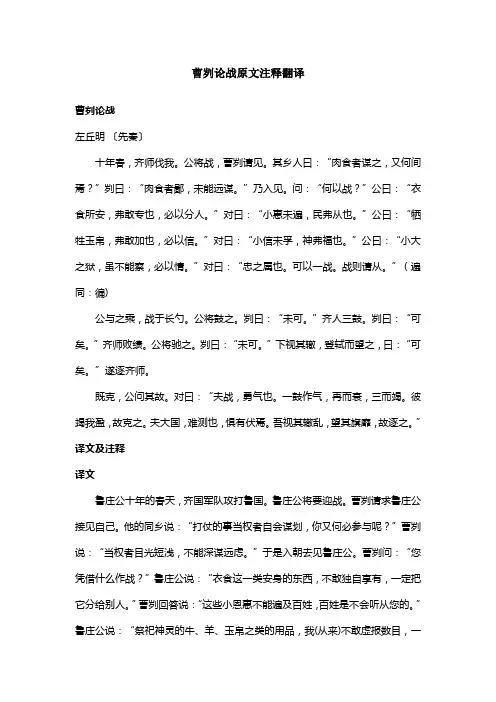
曹刿论战原文注释翻译曹刿论战左丘明〔先秦〕十年春,齐师伐我。
公将战,曹刿请见。
其乡人曰:“肉食者谋之,又何间焉?”刿曰:“肉食者鄙,未能远谋。
”乃入见。
问:“何以战?”公曰:“衣食所安,弗敢专也,必以分人。
”对曰:“小惠未遍,民弗从也。
”公曰:“牺牲玉帛,弗敢加也,必以信。
”对曰:“小信未孚,神弗福也。
”公曰:“小大之狱,虽不能察,必以情。
”对曰:“忠之属也。
可以一战。
战则请从。
”(遍同:徧)公与之乘,战于长勺。
公将鼓之。
刿曰:“未可。
”齐人三鼓。
刿曰:“可矣。
”齐师败绩。
公将驰之。
刿曰:“未可。
”下视其辙,登轼而望之,曰:“可矣。
”遂逐齐师。
既克,公问其故。
对曰:“夫战,勇气也。
一鼓作气,再而衰,三而竭。
彼竭我盈,故克之。
夫大国,难测也,惧有伏焉。
吾视其辙乱,望其旗靡,故逐之。
”译文及注释译文鲁庄公十年的春天,齐国军队攻打鲁国。
鲁庄公将要迎战。
曹刿请求鲁庄公接见自己。
他的同乡说:“打仗的事当权者自会谋划,你又何必参与呢?”曹刿说:“当权者目光短浅,不能深谋远虑。
”于是入朝去见鲁庄公。
曹刿问:“您凭借什么作战?”鲁庄公说:“衣食这一类安身的东西,不敢独自享有,一定把它分给别人。
”曹刿回答说:“这些小恩惠不能遍及百姓,百姓是不会听从您的。
”鲁庄公说:“祭祀神灵的牛、羊、玉帛之类的用品,我(从来)不敢虚报数目,一定按照承诺的去做。
”曹刿说:“这只是小信用,未能让神灵信服,神是不会保佑你的。
”鲁庄公说:“大大小小的案件,虽然不能件件都了解得清楚,但一定要处理得合情合理。
”曹刿回答说:“这才是尽了本职一类的事,可以凭借这个条件打一仗。
如果作战,请允许我跟随您一同去。
”鲁庄公和他共坐一辆战车,在长勺和齐军作战。
鲁庄公将要下令击鼓进军。
曹刿说:“现在不行。
”等到齐军三次击鼓之后。
曹刿说:“可以击鼓进军了。
”齐军溃败。
鲁庄公又要下令驾车马追逐齐军。
曹刿说:“还不行。
”说完就向下看,查看齐军车轮碾出的痕迹,又登上战车,扶着轼远望齐军的队形,这才说:“可以追击了。
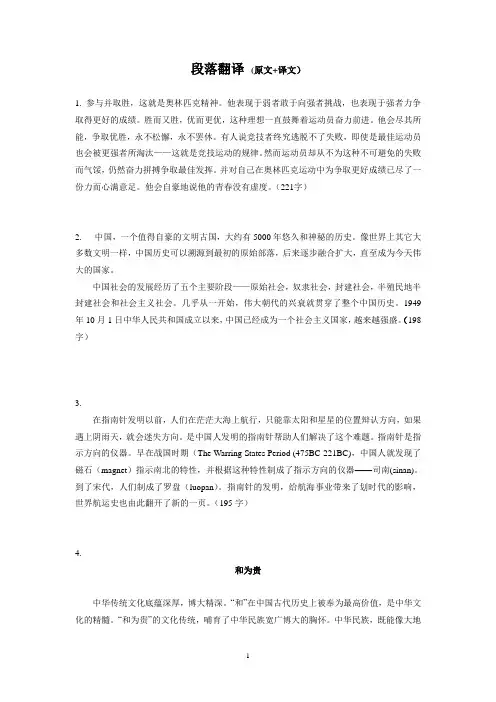
段落翻译(原文+译文)1. 参与并取胜,这就是奥林匹克精神。
他表现于弱者敢于向强者挑战,也表现于强者力争取得更好的成绩。
胜而又胜,优而更优,这种理想一直鼓舞着运动员奋力前进。
他会尽其所能,争取优胜,永不松懈,永不罢休。
有人说竞技者终究逃脱不了失败,即使是最佳运动员也会被更强者所淘汰——这就是竞技运动的规律。
然而运动员却从不为这种不可避免的失败而气馁,仍然奋力拼搏争取最佳发挥。
并对自己在奥林匹克运动中为争取更好成绩已尽了一份力而心满意足。
他会自豪地说他的青春没有虚度。
(221字)2. 中国,一个值得自豪的文明古国,大约有5000年悠久和神秘的历史。
像世界上其它大多数文明一样,中国历史可以溯源到最初的原始部落,后来逐步融合扩大,直至成为今天伟大的国家。
中国社会的发展经历了五个主要阶段——原始社会,奴隶社会,封建社会,半殖民地半封建社会和社会主义社会。
几乎从一开始,伟大朝代的兴衰就贯穿了整个中国历史。
1949年10月1日中华人民共和国成立以来,中国已经成为一个社会主义国家,越来越强盛。
(198字)3.在指南针发明以前,人们在茫茫大海上航行,只能靠太阳和星星的位置辩认方向,如果遇上阴雨天,就会迷失方向。
是中国人发明的指南针帮助人们解决了这个难题。
指南针是指示方向的仪器。
早在战国时期(The Warring States Period (475BC-221BC),中国人就发现了磁石(magnet)指示南北的特性,并根据这种特性制成了指示方向的仪器——司南(sinan)。
到了宋代,人们制成了罗盘(luopan)。
指南针的发明,给航海事业带来了划时代的影响,世界航运史也由此翻开了新的一页。
(195字)4.和为贵中华传统文化底蕴深厚,博大精深。
“和”在中国古代历史上被奉为最高价值,是中华文化的精髓。
“和为贵”的文化传统,哺育了中华民族宽广博大的胸怀。
中华民族,既能像大地承载万物一样,宽厚包容;又能像苍天刚健运行一样,彰显正义。
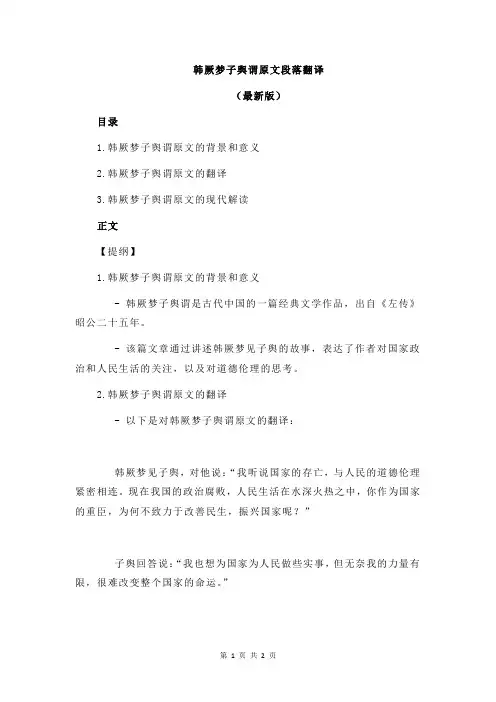
韩厥梦子舆谓原文段落翻译
(最新版)
目录
1.韩厥梦子舆谓原文的背景和意义
2.韩厥梦子舆谓原文的翻译
3.韩厥梦子舆谓原文的现代解读
正文
【提纲】
1.韩厥梦子舆谓原文的背景和意义
- 韩厥梦子舆谓是古代中国的一篇经典文学作品,出自《左传》昭公二十五年。
- 该篇文章通过讲述韩厥梦见子舆的故事,表达了作者对国家政治和人民生活的关注,以及对道德伦理的思考。
2.韩厥梦子舆谓原文的翻译
- 以下是对韩厥梦子舆谓原文的翻译:
韩厥梦见子舆,对他说:“我听说国家的存亡,与人民的道德伦理紧密相连。
现在我国的政治腐败,人民生活在水深火热之中,你作为国家的重臣,为何不致力于改善民生,振兴国家呢?”
子舆回答说:“我也想为国家为人民做些实事,但无奈我的力量有限,很难改变整个国家的命运。
”
韩厥说:“一个人的力量或许有限,但只要每个人都尽心尽力,汇聚起来的力量就可以改变国家。
你应当以身作则,致力于道德修养,为民树立榜样,从而影响更多的人。
”
3.韩厥梦子舆谓原文的现代解读
- 韩厥梦子舆谓原文反映了古代中国社会的政治现实,表达了作者对国家政治和人民生活的关切。
- 文章通过韩厥和子舆的对话,强调了道德伦理在国家政治中的重要作用,提倡每个人都尽心尽力,以身作则,共同为国家的繁荣和人民的幸福做出贡献。
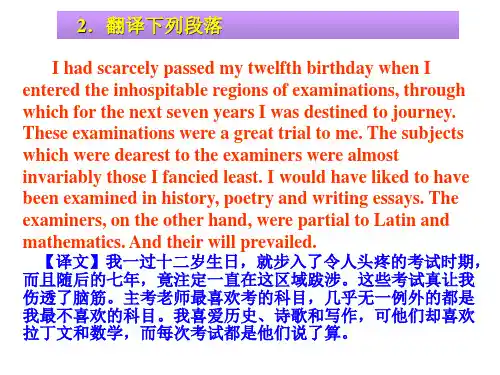
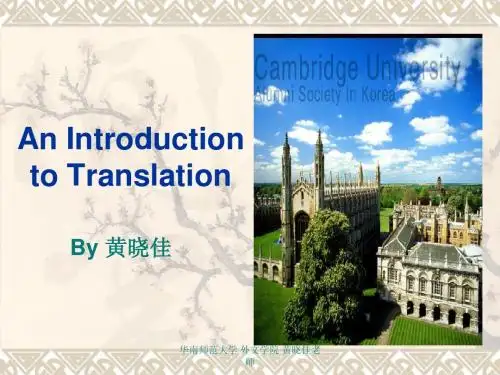
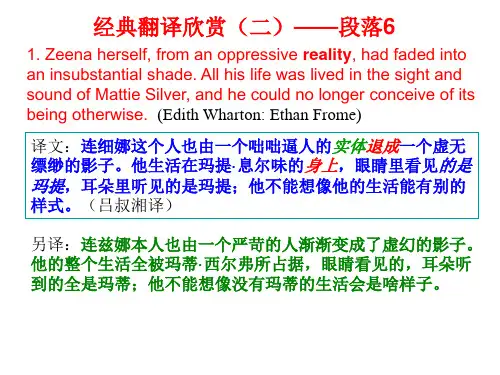

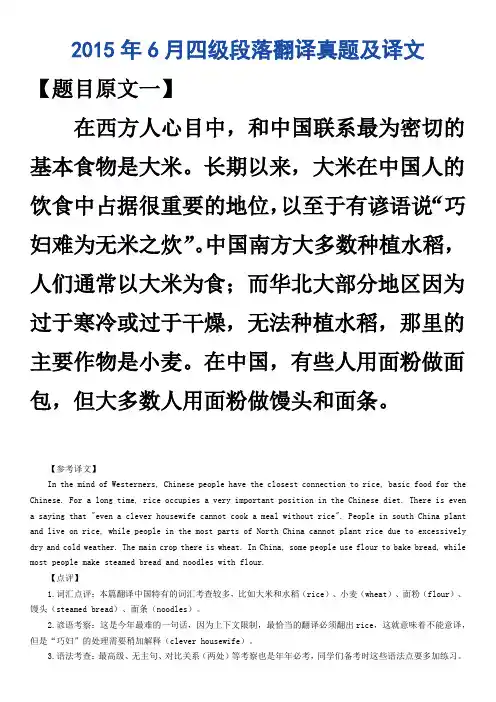
2015年6月四级段落翻译真题及译文【题目原文一】在西方人心目中,和中国联系最为密切的基本食物是大米。
长期以来,大米在中国人的饮食中占据很重要的地位,以至于有谚语说“巧妇难为无米之炊”。
中国南方大多数种植水稻,人们通常以大米为食;而华北大部分地区因为过于寒冷或过于干燥,无法种植水稻,那里的主要作物是小麦。
在中国,有些人用面粉做面包,但大多数人用面粉做馒头和面条。
【参考译文】In the mind of Westerners, Chinese people have the closest connection to rice, basic food for the Chinese. For a long time, rice occupies a very important position in the Chinese diet. There is even a saying that "even a clever housewife cannot cook a meal without rice". People in south China plant and live on rice, while people in the most parts of North China cannot plant rice due to excessively dry and cold weather. The main crop there is wheat. In China, some people use flour to bake bread, while most people make steamed bread and noodles with flour.【点评】1.词汇点评:本篇翻译中国特有的词汇考查较多,比如大米和水稻(rice)、小麦(wheat)、面粉(flour)、馒头(steamed bread)、面条(noodles)。
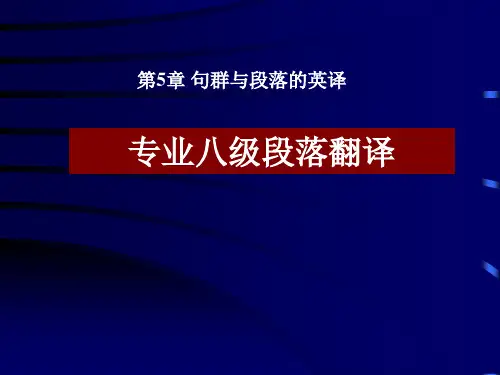
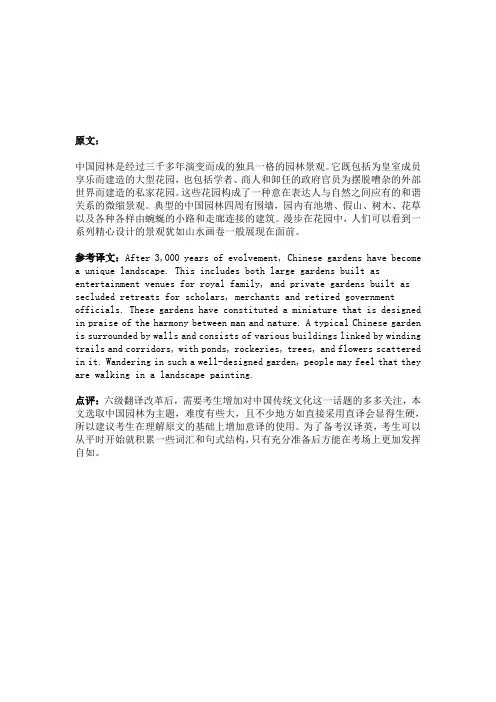
原文:中国园林是经过三千多年演变而成的独具一格的园林景观。
它既包括为皇室成员享乐而建造的大型花园,也包括学者、商人和卸任的政府官员为摆脱嘈杂的外部世界而建造的私家花园。
这些花园构成了一种意在表达人与自然之间应有的和谐关系的微缩景观。
典型的中国园林四周有围墙,园内有池塘、假山、树木、花草以及各种各样由蜿蜒的小路和走廊连接的建筑。
漫步在花园中,人们可以看到一系列精心设计的景观犹如山水画卷一般展现在面前。
参考译文:After 3,000 years of evolvement, Chinese gardens have become a unique landscape. This includes both large gardens built as entertainment venues for royal family, and private gardens built as secluded retreats for scholars, merchants and retired government officials. These gardens have constituted a miniature that is designed in praise of the harmony between man and nature. A typical Chinese garden is surrounded by walls and consists of various buildings linked by winding trails and corridors, with ponds, rockeries, trees, and flowers scattered in it. Wandering in such a well-designed garden, people may feel that they are walking in a landscape painting.点评:六级翻译改革后,需要考生增加对中国传统文化这一话题的多多关注,本文选取中国园林为主题,难度有些大,且不少地方如直接采用直译会显得生硬,所以建议考生在理解原文的基础上增加意译的使用。
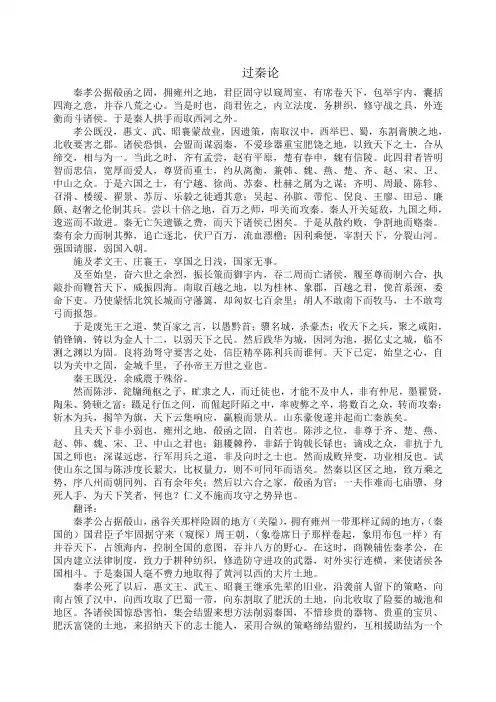
过秦论秦孝公据殽函之固,拥雍州之地,君臣固守以窥周室,有席卷天下,包举宇内,囊括四海之意,并吞八荒之心。
当是时也,商君佐之,内立法度,务耕织,修守战之具,外连衡而斗诸侯。
于是秦人拱手而取西河之外。
孝公既没,惠文、武、昭襄蒙故业,因遗策,南取汉中,西举巴、蜀,东割膏腴之地,北收要害之郡。
诸侯恐惧,会盟而谋弱秦,不爱珍器重宝肥饶之地,以致天下之士,合从缔交,相与为一。
当此之时,齐有孟尝,赵有平原,楚有春申,魏有信陵。
此四君者皆明智而忠信,宽厚而爱人,尊贤而重士,约从离衡,兼韩、魏、燕、楚、齐、赵、宋、卫、中山之众。
于是六国之士,有宁越、徐尚、苏秦、杜赫之属为之谋;齐明、周最、陈轸、召滑、楼缓、翟景、苏厉、乐毅之徒通其意;吴起、孙膑、带佗、倪良、王廖、田忌、廉颇、赵奢之伦制其兵。
尝以十倍之地,百万之师,叩关而攻秦。
秦人开关延敌,九国之师,逡巡而不敢进。
秦无亡矢遗镞之费,而天下诸侯已困矣。
于是从散约败,争割地而赂秦。
秦有余力而制其弊,追亡逐北,伏尸百万,流血漂橹;因利乘便,宰割天下,分裂山河。
强国请服,弱国入朝。
施及孝文王、庄襄王,享国之日浅,国家无事。
及至始皇,奋六世之余烈,振长策而御宇内,吞二周而亡诸侯,履至尊而制六合,执敲扑而鞭笞天下,威振四海。
南取百越之地,以为桂林、象郡,百越之君,俛首系颈,委命下吏。
乃使蒙恬北筑长城而守藩篱,却匈奴七百余里;胡人不敢南下而牧马,士不敢弯弓而报怨。
于是废先王之道,焚百家之言,以愚黔首;隳名城,杀豪杰;收天下之兵,聚之咸阳,销锋镝,铸以为金人十二,以弱天下之民。
然后践华为城,因河为池,据亿丈之城,临不测之渊以为固。
良将劲弩守要害之处,信臣精卒陈利兵而谁何。
天下已定,始皇之心,自以为关中之固,金城千里,子孙帝王万世之业也。
秦王既没,余威震于殊俗。
然而陈涉,瓮牖绳枢之子,甿隶之人,而迁徒也,才能不及中人,非有仲尼,墨翟贤,陶朱、猗顿之富;蹑足行伍之间,而倔起阡陌之中,率疲弊之卒,将数百之众,转而攻秦;斩木为兵,揭竿为旗,天下云集响应,赢粮而景从。
2020年高考英语全国卷一阅读理解C原文、译文(逐段翻译)、长难句分析及答案详解第一部分:原文和译文Race walking shares many fitness benefits with running, research shows, while most likely contributing to fewer injuries. It does, however, have its own problem.尽管很可能竞走对身体的损伤更少,但是研究表明,在对健康的好处方面,竞走和跑步是一样的。
然而,竞走也确实有自身的问题。
Race walkers are conditioned athletes. The longest track and field event at the Summer Olympics is the 50-kilometer race walk, which is about five miles longer than the marathon. But the sport’s rules require that a race walker’s knees stay straight through most of the legswing and one foot remain in contact (接触) with the ground at all times. It’s this strangeform that makes race walking such an attractive activity, however, says Jaclyn Norberg, an assistant professor of exercise science at Salem State University in Salem, Mass.竞走运动员是条件受到限制的运动员。
许多人喜欢中餐,在中国,烹饪不仅被视为一种技能,而且也被视为一种艺术。
精心准备的中餐既可口又好看,烹饪技艺和配料在中国各地差别很大。
但好的烹饪都有一个共同点,总是要考虑到颜色、味道、口感和营养(nutrition)。
由于食物对健康至关重要,好的厨师总是努力在谷物、肉类和蔬菜之间取得平衡,所以中餐既味美又健康。
参考译文:Most people like Chinese food. In China, cooking is considered as not only a skill but also an art. The well-prepared Chinese food is both delicious and good-looking. Although cooking methods and food ingredient vary wildly in different places of China, it is common for good cuisine to take color, flavor, taste and nutrition into account. Since food is crucial to health, a good chef is insistently trying to seek balance between cereal, meat and vegetable, and accordingly Chinese food is delicious as well as healthy.信息技术(Information Technology),正在飞速发展,中国公民也越来越重视信息技术,有些学校甚至将信息技术作为必修课程,对这一现象大家持不同观点。
一部分人认为这是没有必要的,学生就应该学习传统的课程。
另一部分人认为这是应该的,中国就应该与时俱进。
B班(18篇)Passage1传统上说,中国人在60岁以前对生日并不太注意。
六十大寿被认为是人生中极为重要的一次,因此经常要举行盛大的庆祝。
在此之后每隔10年就要举行一场生日庆祝,也就是70岁、80岁等,直到去世为止。
大体上说,人的年龄越大,庆祝的场合就越隆重。
生日经常是由成年子女来为他们的父母庆祝,以表现出对父母的尊敬并就父母为他们所做的一切表达自己的谢意。
(162字)参考译文:Traditionally, Chinese people do not pay a lot of attention to birthdays until they are 60 years old. The 60th birthday is regarded as a very important point of life and therefore there is often a big celebration. After that, a birthday celebration is held every ten years, that is the 70th, the 80th, etc, until the person’s death. Generally, the older the person is, the greater the celebration occasion is. It is often the grownup sons and daughters who celebrate their elderly parents’ birthdays to show their respect for them and express their thanks for all that they have done for their children.Passage2丝绸是中国古老文化的象征,为促进世界人类文明的发展做出了不可磨灭的贡献。
陋室铭原文翻译及赏析陋室铭原文翻译及赏析4篇陋室铭原文翻译及赏析1山不在高,有仙则名。
水不在深,有龙则灵。
斯是陋室,惟吾德馨。
苔痕上阶绿,草色入帘青。
谈笑有鸿儒,往来无白丁。
可以调素琴,阅金经。
无丝竹之乱耳,无案牍之劳形。
南阳诸葛庐,西蜀子云亭。
孔子云:“何陋之有?”[译文]山不在于多高,有神仙(居住)就能声名远扬。
水不在于多深,有龙(居住)就能显得有灵气。
这是间简陋的屋子,只是我(住屋的人)的品德高尚(就不觉得简陋了)。
苔藓碧绿的痕迹蔓延到台阶上;草色青葱,映入竹帘里。
到这里谈笑的都是渊博的大学者,交往的没有知识浅薄的人。
可以弹奏朴素的古琴,阅读佛经。
没有(嘈杂的)音乐扰乱双耳,没有官府的公文使身体劳累。
(我的陋室就像那)南阳诸葛亮的茅庐,西蜀扬子云的亭子。
孔子说:“有什么简陋的呢?”赏析:《陋室铭》选自《全唐文》卷六百零八集,为唐代诗人刘禹锡(字梦得)所作。
《陋室铭》聚描写、抒情、议论于一体。
通过具体描写"陋室"恬静、雅致的环境和主人高雅的风度来表述自己两袖清风的情怀。
文章运用了对比,白描,隐寓,用典等手法,而且压韵,韵律感极强,读来金石掷地又自然流畅,一曲既终,犹余音绕梁,让人回味无穷。
文章表现了作者不与世俗同流合污,洁身自好、不慕名利的生活态度。
表达了作者高洁傲岸的情操,流露出作者安贫乐道的隐逸情趣。
这篇不足百字的室铭,含而不露地表现了作者安贫乐道、洁身自好的高雅志趣和不与世事沉浮的独立人格。
它向人们揭示了这样一个道理:尽管居室简陋、物质匮乏,但只要居室主人品德高尚、生活充实,那就会满屋生香,处处可见雅趣逸志,自有一种超越物质的神奇精神力量。
有人认为,刘禹锡写此文时已是贬谪生活的后期,心情比较稳定,追求安乐恬淡的生活,同时文中又有读佛经的内容,所以铭文流露了一种避世消闲的消极成分。
对此应从两方面分析:当社会处于黑暗时期,文人官吏们有两个出路,一是与腐朽势力同流合污、自甘堕落。
六级段落翻译参考译文1)中国是世界上最大的发展中国家,人口约占世界总人口的22%。
在过去相当长的时期里,由于诸多原因,贫困一直困扰着中国。
20世纪80年代中期,中国农村绝大多数地区凭借自身的发展优势,经济得到快速增长,但少数地区由于经济、社会、历史、自然等方面的制约,发展相对滞后。
中国政府在致力于经济和社会全面发展的进程中,在全国范围内实施了以解决贫困人口温饱问题为主要目标的有计划、有组织的大规模扶贫开发,极大地缓解了贫困现象。
China is the largest developing co untry in the world and its population accounts for about 22 percent of the world’s total. For a long period of its history, China has been plagued by poverty for various reasons. In the mid-1980s, the economy of an overwhelming majority of the rural areas in China grew dramatically by virtue of their own advantages, but a small number of areas still lagged behind because of the constraints of their economic, social, historical, and natural conditions. The Chinese government, while working on all-round economic and social development, has nationwide implemented a large-scale program for development-oriented poverty relief in a planned and organized way. With the main objective of helping poverty-stricken people solve the food and clothing problems, this program has gone a long way toward alleviating poverty.2)北京有无数的胡同(hutong)。
段落翻译(原文+译文)1. 参与并取胜,这就是奥林匹克精神。
他表现于弱者敢于向强者挑战,也表现于强者力争取得更好的成绩。
胜而又胜,优而更优,这种理想一直鼓舞着运动员奋力前进。
他会尽其所能,争取优胜,永不松懈,永不罢休。
有人说竞技者终究逃脱不了失败,即使是最佳运动员也会被更强者所淘汰——这就是竞技运动的规律。
然而运动员却从不为这种不可避免的失败而气馁,仍然奋力拼搏争取最佳发挥。
并对自己在奥林匹克运动中为争取更好成绩已尽了一份力而心满意足。
他会自豪地说他的青春没有虚度。
(221字)【参考译文】To participate and win — that is the Olympic spirit. It finds expression in the weak daring to defy the strong, and the strong striving for ever better performance. “Ever better”— the ideal is always luring a sportsman forward. He will do everything he can for it, never relax, never give up. It is said that none of the competitors can avoid being defeated — even the best is to be surpassed by someone still stronger. This is rule of sports. However, undaunted by the inevitable failure, the sportsman is always striving to do the best he can and content with the fact that he has done his bit for the “ever better” records in the Olympic Games. He will say proudly that he has not lived his youth in vain.(陈艳粉供稿)2. 中国,一个值得自豪的文明古国,大约有5000年悠久和神秘的历史。
像世界上其它大多数文明一样,中国历史可以溯源到最初的原始部落,后来逐步融合扩大,直至成为今天伟大的国家。
中国社会的发展经历了五个主要阶段——原始社会,奴隶社会,封建社会,半殖民地半封建社会和社会主义社会。
几乎从一开始,伟大朝代的兴衰就贯穿了整个中国历史。
1949年10月1日中华人民共和国成立以来,中国已经成为一个社会主义国家,越来越强盛。
(198字)【参考译文】China, one of the countries that can boast of an ancient civilization, has a long and mysterious history—almost 5,000 years of it! Like most other great civilizations of the world, China can trace her culture back to a blend of small original tribes which have expanded till they become the great country we have today.Chinese society has progressed through five major stages—Primitive Society, Slave Society, Feudal Society, Semi-feudal and Semi-colonial Society, and Socialist Society. The rise and fall ofthe great dynasties forms a thread that runs through Chinese history, almost from the beginning. Since the founding of the People's Republic of China on October 1st, 1949, China has become a socialist country and become stronger and stronger.(陈艳粉供稿)3.在指南针发明以前,人们在茫茫大海上航行,只能靠太阳和星星的位置辩认方向,如果遇上阴雨天,就会迷失方向。
是中国人发明的指南针帮助人们解决了这个难题。
指南针是指示方向的仪器。
早在战国时期(The Warring States Period (475BC-221BC),中国人就发现了磁石(magnet)指示南北的特性,并根据这种特性制成了指示方向的仪器——司南(sinan)。
到了宋代,人们制成了罗盘(luopan)。
指南针的发明,给航海事业带来了划时代的影响,世界航运史也由此翻开了新的一页。
(195字)【参考译文】Before the compass was invented, most people identified the direction at sea, only depending upon the position of the sun and stars. If it was cloudy or rainy, people would lose their direction. It was the compass, invented by the Chinese people, that solved this problem. The compass is the instrument used for indicating direction. As early as the Warring States Period (475BC-221BC), the Chinese discovered that a magnet could be applied to indicate the south and north, and a direction-indicating instrument sinan was made on the basis of this feature. In the Song Dynasty, people created a compass called luopan. The invention of the compass has an epoch-making influence on navigation, thereby opening up a new era in the history of international navigation.(陈娴供稿)4.和为贵中华传统文化底蕴深厚,博大精深。
“和”在中国古代历史上被奉为最高价值,是中华文化的精髓。
“和为贵”的文化传统,哺育了中华民族宽广博大的胸怀。
中华民族,既能像大地承载万物一样,宽厚包容;又能像苍天刚健运行一样,彰显正义。
国强必霸,不适合中国。
称霸,既有悖于我们的文化传统,也违背中国人民意志。
中国的发展不损害任何人,也不威胁任何人。
中国要做和平的大国,学习的大国,合作的大国,致力于建设一个和谐的世界。
(199字)【参考译文】The traditional Chinese culture is rich, extensive and profound. Harmony, the supreme value cherished in ancient China, lies at the heart of the Chinese culture, which has nurtured the broad mind of the Chinese nation. The Chinese nation is generous and tolerant, just as Mother Earth cares for all living things and s he is in constant pursuit of justice, just as the eternal movement of the Universe.The argument that a big power is bound to seek hegemony does not apply to China. Seeking hegemony goes against China’s cultural tradition as well as the will of the Chinese people. China’s development harms no one and threatens no one. We shall be a peace-loving country, a country that is eager to learn from and cooperate with others. We are committed to building a harmonious world.(陈颖供稿)5. 儒家思想是中国传统文化的基石。
它出现在大约2,500年前的春秋(the Spring and Autumn Period),是建立在夏、商、周朝的传统文化之上,并由孔子创立的完整观念体系(ideological system)。
儒家思想博大精深,涵盖了人文,政治,法律,教育,哲学,道德各个领域。
儒家文化以人本哲学(humanistic philosophy)为依托,这表现在它对人类个体的尊敬,关注和热爱。
总而言之,儒家文化是世界文化遗产的重要组成部分,是东方文化的代表,也是中国文化传统的中流砥柱。
(191字)【参考译文】Confucianism is the cornerstone of traditional Chinese culture. Founded about 2,500 years ago in the Spring and Autumn Period, Confucianism is a complete ideological system created by Confucius, based on the traditional culture of the Xia, Shang, and Zhou Dynasties. It is extensive and profound, covering the fields of humanity, politics, law, education, philosophy and ethics. Confucian culture rests on humanistic philosophy, which is shown in its respect for, attention to and love for human individuals. In brief, Confucian culture is an important component of world culture heritage, a major representative of oriental culture, and the dominant facet of Chinese cultural tradition.(李玉萍供稿)6.中国制造企业似乎无所不能,小到苹果产品iPad,大到高铁、甚至世界领先的电信设备,生产的商品包罗万象,但却似乎生产不了一个自己的精致小手袋。